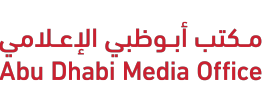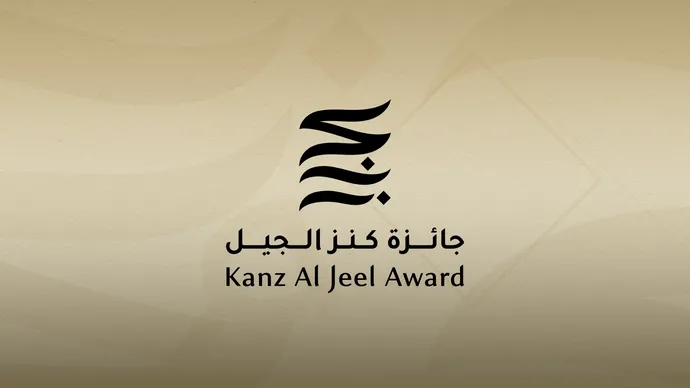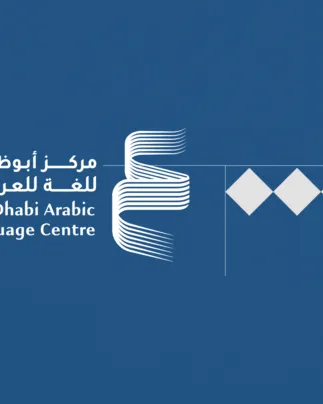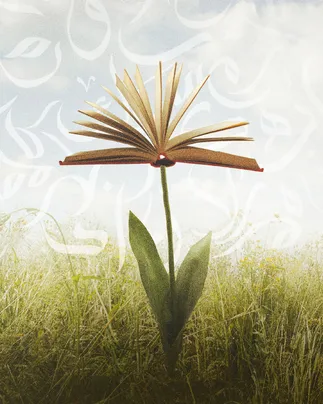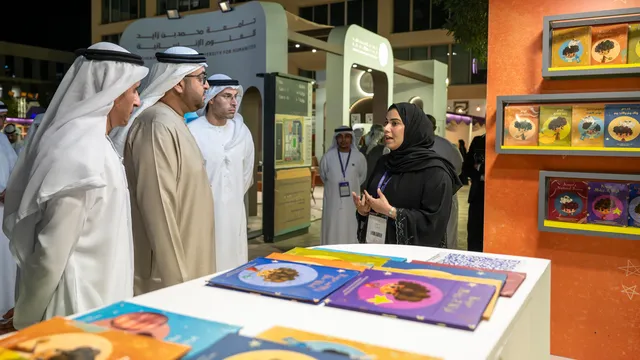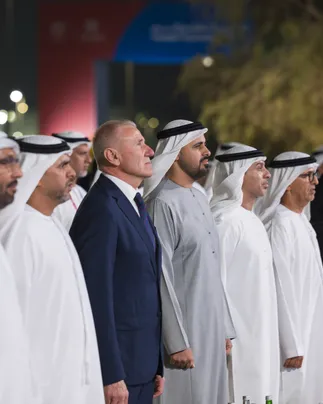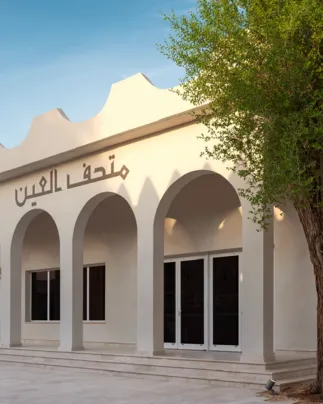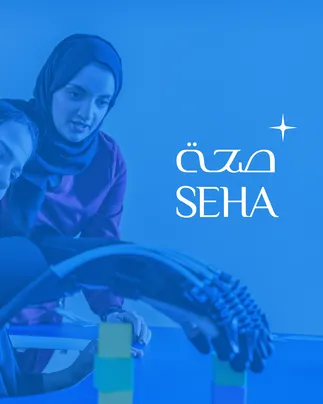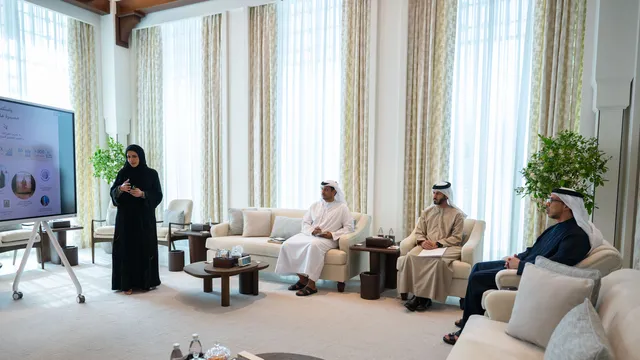The Abu Dhabi Arabic Language Centre (ALC), part of the Department of Culture and Tourism - Abu Dhabi (DCT Abu Dhabi), has announced the winners in the fourth edition of the Kanz Al Jeel Award. The winners will be honoured at a special ceremony on 24 November at Qasr Al Muwaiji in Al Ain Region, which will also mark the opening of the Al Ain Book Festival 2025, organised by the ALC from 24-30 November.
His Excellency Mohamed Khalifa Al Mubarak, Chairman of DCT Abu Dhabi, said: “The Kanz Al Jeel Award honours creative minds whose works continue to enrich the cultural and folk poetry landscape. Through their words and ideas, they preserve our heritage while inspiring new forms of artistic expression. At DCT Abu Dhabi, we are deeply committed to nurturing and recognising creativity in all its forms, ensuring that our cultural traditions continue to evolve and thrive. The award reflects our belief that heritage and innovation are inseparable pillars of our identity, both vital to sustaining a vibrant cultural future for generations to come.”
The Arts category of the award saw Nagat Soliman from Egypt win for her work Tears Streamed From My Eyes, which stood out for its visual composition and conceptual depth. The piece is a textile artwork that combines collage, hand embroidery, and dyeing techniques to present a harmonious visual formation that invites the viewer on an exploratory journey through its intricate details and layered symbols.
In the Poetic Publications category, Kuwaiti poet Hamed Zaid won for his collection Wa Abqa Jabal, published by Platinum Book Publishing in 2025. The judging panel noted the maturity and strength of the poems, the skilful balance between condensing and expanding, and the masterful use of rhetorical devices, such as puns, repetition, and antithesis, all while maintaining a clear, confident voice that conveys pride and a strong sense of identity.
In the Poetry Matching category, Omani poet Ali Al Harthi won for his poem Sada Al Noor, which demonstrates a complete parallel with the late Sheikh Zayed’s poem Li Sart Min Al Ain Saraya. Al Harthi’s verses flow seamlessly without unjustified repetition, maintaining a clear balance between authenticity and creative addition, and employing words with deep meaning and resonance.
Emirati writer and researcher Ali Abualreesh Al Mansoori won the Studies and Research category for his book Zayed: Poetic Worlds Bound by the Horizon – A Trilogy of Love, Palm, and Desert, published by Nabati Publishing House in 2025. The study explores key themes in the poetry of the late Sheikh Zayed bin Sultan Al Nahyan, including ethics, beauty, womanhood, love, analogy, youth, and peace.
Drawing on testimonials from prominent critics and authors such as Hamad Khalifa Bu Shihab, Dr Falih Handal, and Dr Ghassan Al Hassan, Abualreesh aims to underscore the central ideas in the Founding Father’s verse, with its focus on the importance of the human being, morals, and values. The researcher addresses artistic aspects of Sheikh Zayed’s poetry, noting its profound meanings, pleasant language, and the simple-yet-unattainable quality of his language. This approach makes the study a valuable addition to libraries, cultural institutions, and educational establishments across the UAE, offering a new gateway to Nabati poetry through a close reading of Sheikh Zayed’s works.
Rounding up the winners list, Emirati poet Mohammed Rashid Al Shamsi was named Creative Personality for this year’s edition of the award, in recognition of his prolific and distinguished poetic output throughout his career, which began in the 1970s. Al Shamsi was a contemporary of many leading Nabati poets and has excelled across numerous poetic genres, foremost among them ghazal (love poetry), along with various other forms of poetry. He also produced notable works in fields such as complaint arts and Taghareed, while playing a prominent role in reviving the traditional Emirati performance art of Al Razeef. Al Shamsi’s poems have spread across the Emirates and have been performed by leading singers.
His Excellency Dr Ali bin Tamim, Chairman of the ALC, said: “The Kanz Al Jeel Award continues to grow in stature, attracting distinguished participants from around the world whose innovative works align with its mission to honour serious contributions in creativity and research that explore Nabati poetry and the timeless values it upholds. The award encourages new generations to engage with their cultural heritage and reinterpret it through a modern lens, producing new creative works in poetry, spoken and visual arts, calligraphy and design, which bridge past and present. As a source of inspiration, Kanz Al Jeel enriches our collective knowledge, celebrates excellence in creativity, and reinforces the Arabic language as a living medium of thought and artistic expression.”
Ali Obaid Al Hameli, Chair of the award’s Higher Committee, said: “With each new edition, the Kanz Al Jeel Award continues to elevate the creative and research sectors through valuable works, upholding the highest standards of competence and integrity in evaluating an ever-growing and diverse pool of submissions. To identify the most distinguished among them, the award applies precise criteria that reflect the aesthetics of Nabati poetry and a deep engagement with authentic Emirati and Arab heritage.
“The Kanz Al Jeel Award has succeeded in uniting creativity, thought, and critique to foster a vibrant poetic and artistic movement, one that draws inspiration from the creative legacy of the late Sheikh Zayed bin Sultan Al Nahyan.”
The winner in the Creative Personality category will receive a gold medallion bearing the award’s emblem, a certificate of appreciation, and an AED500,000 prize. Winners in the remaining categories receive a gold medallion and a certificate of appreciation, and an AED200,000 prize.
The Kanz Al Jeel Award strives to enrich and preserve Nabati poetry and folk heritage, ensuring it is passed on to future generations. The award encourages creative arts that are connected to this cherished literary tradition, honouring creators in its various related fields, and celebrating achievements that reflect the depth of the Arabic language.
